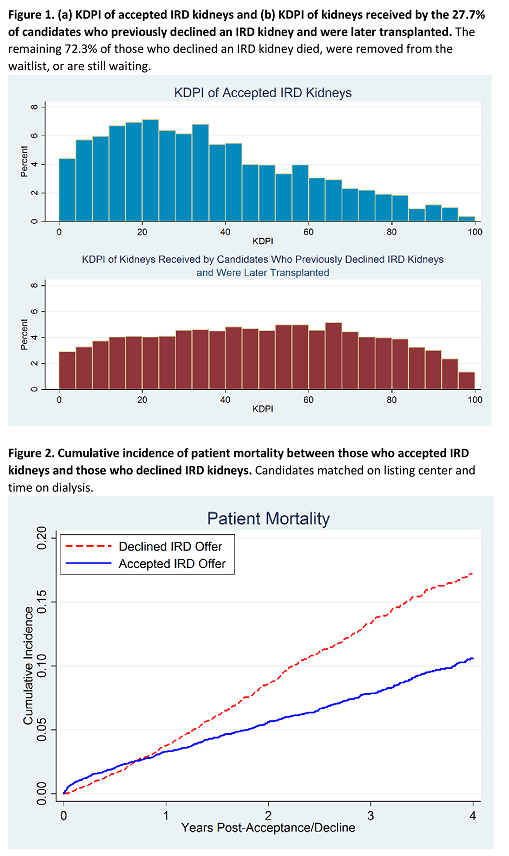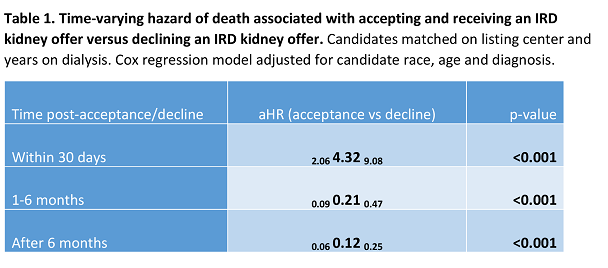Higher Mortality Among Candidates Who Refused Increased-Infectious Risk Kidney Offers.
JHU, Baltimore
Meeting: 2017 American Transplant Congress
Abstract number: 492
Session Information
Session Name: Concurrent Session: DCD and Infectious Risk Kidney Donors
Session Type: Concurrent Session
Date: Tuesday, May 2, 2017
Session Time: 4:30pm-6:00pm
 Presentation Time: 5:18pm-5:30pm
Presentation Time: 5:18pm-5:30pm
Location: E450b
Increased infectious risk donors (IRD) are younger and healthier than most deceased donors, but IRD kidneys are discarded at higher rates despite potential benefit to transplant candidates. We aimed to characterize the survival benefit of accepting vs declining an IRD kidney offer.
METHODS Using 2010-2014 SRTR data, we identified 107,658 adult kidney transplant candidates who were offered an IRD kidney that was eventually used for transplantation. We used Cox regression to compare mortality between those who accepted an IRD kidney (n=5,821) vs those who declined (n=101,837), matching on listing center and time on dialysis and adjusting for candidate characteristics.
RESULTS Candidates who accepted IRDs had spent more time on dialysis (3.2 vs 1.9 years, p<0.001) and were more likely to be white (41.6% vs 39.3%,p<0.001) than those who declined IRDs. Of those who declined, 23.6% eventually received non-IRD kidneys and 4.1% received IRD kidneys after waiting an additional 10.9(4.0-21.8) and 11.2(4.2-22.3) months, respectively. Accepted IRD kidneys had lower median KDPI (32.3[17.5-52.0]) than non-IRD kidneys received later (51.8[29.7-71.4])(Figure 1, p<0.001). In the first 30 days, survival was 99.3% and 99.6% among those who accepted and declined IRDs, respectively (Figure 2, p<0.001). Past the first month of perioperative risk, those who accepted IRDs were at 79% lower risk of death [aHR 0.090.210.47,p<0.001], and past 6 months at 88% lower risk of death [aHR0.060.120.25,p<0.001] when compared those who declined IRDs (Table 1).
CONCLUSION Those who accepted and received IRD kidneys experienced long-term improved survival compared to those who declined. Accepting an otherwise high-quality IRD kidney provides survival benefit to transplant candidates while reducing the burden of the organ shortage.

CITATION INFORMATION: Bowring M, Kucirka L, Massie A, Holscher C, Segev D. Higher Mortality Among Candidates Who Refused Increased-Infectious Risk Kidney Offers. Am J Transplant. 2017;17 (suppl 3).
To cite this abstract in AMA style:
Bowring M, Kucirka L, Massie A, Holscher C, Segev D. Higher Mortality Among Candidates Who Refused Increased-Infectious Risk Kidney Offers. [abstract]. Am J Transplant. 2017; 17 (suppl 3). https://atcmeetingabstracts.com/abstract/higher-mortality-among-candidates-who-refused-increased-infectious-risk-kidney-offers/. Accessed February 21, 2026.« Back to 2017 American Transplant Congress
